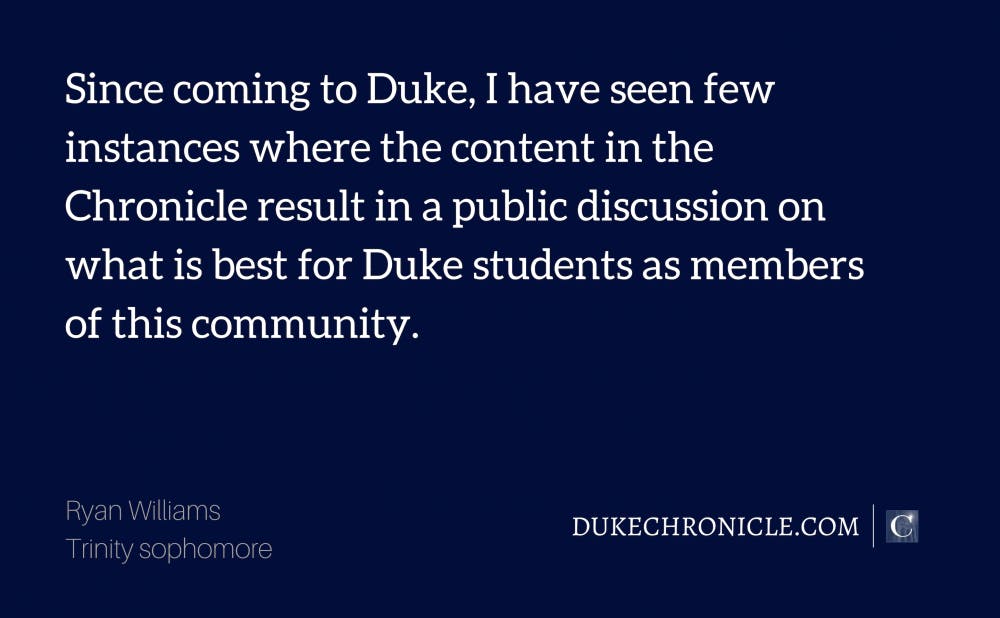When I first read my fellow columnist and co-worker, Lizzie Bond’s, latest column, my gut reaction was to issue a quick fortification of my previous case for Selective Living Groups—”A greater defense for SLGs” if you will. After reading her column, and trying to see Duke social life through her lens, however, I can truly only say two words: “thank you.”
While we may disagree on a few key issues, Lizzie’s response to the article I wrote was simply brilliant if for no other reason than that it publically propelled an important campus conversation. Since coming to Duke, I have seen few instances where the content in the Chronicle result in a public discussion on what is best for Duke students as members of this community. But, since the day my previous column was published, I have seen story after story about the ways people interact with and experience selective living on campus. From one columnist’s rush FAQ, to another’s hindsight on not receiving a bid his freshman year, even to the more public display of anti-rush banners in West Union, the fact that Duke’s campus is engaging in a lively conversation about what this time of year means for students and their place on their campus encourages me to no end.
What I have seen since rush season began is an undying conversation about the best way for students to integrate into a larger campus community while finding places where they can feel more at home. It is precisely this undying conversation that excites me most about the work my fellow columnists are producing and encourages me to seek out the tough campus conversations that I came to Duke to have. Whether that is in the pages of the Duke Chronicle or on the couches in Au Bon Pain, these past two weeks have been some of the most intellectually engaging I have had at Duke. This is all thanks to different viewpoints and perspectives about rush being continuously brought to the attention of the greater Duke community.
Conversations like these are why student publications, public discourse, and the freedom of speech are so important. Exposing ourselves to opposing viewpoints allows for the greater engagement in a never ending public forum aimed at making Duke better for us all. Granted, that doesn’t mean every word printed in the Chronicle or spewed from a public platform is impervious to criticism. The second I wrote “The case for SLGs,” I prepared myself for any critique that could and would ultimately come my way. Moreover, as Nathan Heffernan pointed out in his recent column, the freedom of expression that comes with writing your own column does not mean that writers and readers should stop listening to, learning about,, and considering experiences different from our own—especially those coming from marginalized communities.
I have been glued to the words in the Chronicle since I have come to Duke. For better, what’s printed and published in this student newspaper forces the campus community to reconcile with its deepest sources of division. Appealing to students to send their money “just about anywhere” other than Duke put pressure on upper administration to spend their money more intentionally. A former line-monitors plea to kill the walk-up line after a mob-like scene led to its ultimate demise. The discourse over one student’s defense of recently appointed Supreme Court Justice Brett Kavanaugh led to a public debate about the confirmation hearing, masculinity, and the future of politics. These and countless other examples showcase the power of the publication of different viewpoints.
With all that being said, if I am able to write something that leads to or contributes to the campus conversations that we need to be having, I am more than willing to stick my neck out for the sake of public debate. The jest Lizzie and I engaged in over the course of two articles shows me that students on this campus have the backbone to stand up for what they think is right. It shows me that I am surrounded by students who are willing to publicly proclaim their trust and let the chips fall where they may. That’s why journalism and public discourse is so important. So, Lizzie Bond, thank you for showing me the importance of speaking your truth even if it means speaking out against what’s normative.
Ryan Williams is a Trinity sophomore and current Cooper House Rush Chair. His column runs on alternate Wednesdays.
Get The Chronicle straight to your inbox
Sign up for our weekly newsletter. Cancel at any time.

